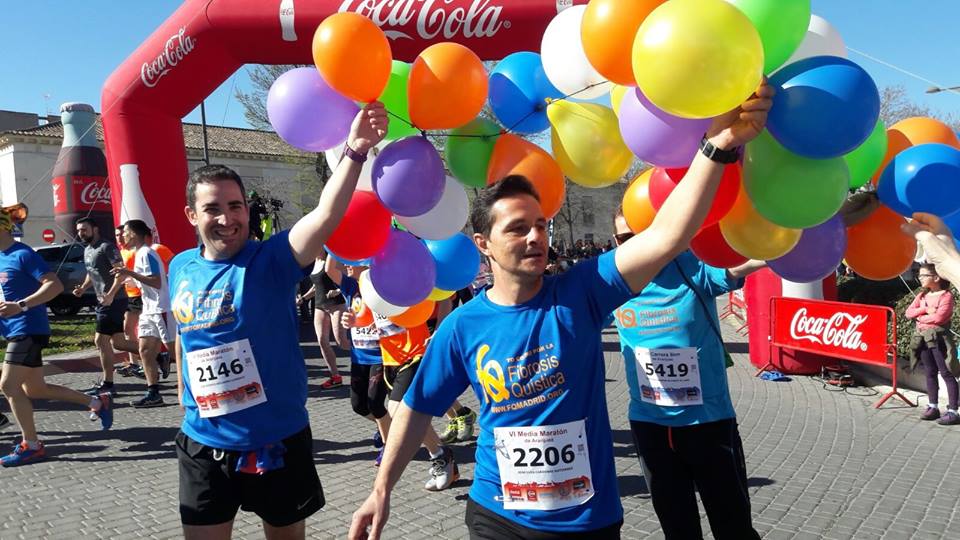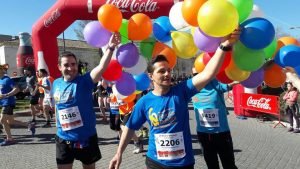CF Patients to Run in Madrid Marathon to Spread Awareness and Win Orkambi Approval in Spain
Written by |

Cystic fibrosis patient José Vicente Escudero Carrero, left, and José Cárdenas, whose daughter also has CF, run a recent half-marathon in Spain. (Photo credit: Asociación Madrileña Contra la Fibrosis Quística)
Running a full marathon isn’t a piece of cake for trained athletes, let alone people who struggle to breathe under normal circumstances.
Yet two Spaniards with cystic fibrosis (CF) will be among the 40,000 people running in Madrid’s Rock ‘n’ Roll Marathon on Sunday, April 23. The annual 42-kilometer race, which began in 1978, takes place every April in Spain’s capital city.
José Vicente Escudero Carrero of Madrid and Laura García Herranz of Barcelona, both 39, hope their run calls attention to the role of sports in managing the disease.
They also have another goal: to convince their government to allow the sale of Orkambi (lumacaftor/ivacaftor). The U.S. Food and Drug Administration approved it in July 2015 and the European Medicines Agency four months later. Boston-based Vertex developed the drug, which is taken in conjunction with other therapies.
“We’re trying to make it easier for Spaniards with cystic fibrosis to access this medication, and our group supports these two runners,” Alfredo Gil González, with the Asociación Madrileña Contra la Fibrosis Quística, told Cystic Fibrosis News Today in a phone interview from Madrid.
González said his organization has about 370 member families. He estimated that Madrid is home to at least 600 people with CF, and that the disease’s prevalence in Spain is about one in 3,000.
Orkambi is designed for CF patients 12 or older with two copies of the F508del mutation in their CFTR gene — which accounts for about half of all CF cases. The drug is expensive, however.
Last year, the U.K. National Institute for Health and Care Excellence (NICE) recommended against the British government adding Orkambi to the treatments it offers. It cite annual costs of £104,000, or $147,000, per patient. After Orkambi won FDA approval, Vertex announced that the therapy’s list price for U.S. patients would be $259,000 a year.
Even so, González explained, “we are pressuring the government to approve this drug. Laboratories have to negotiate the price with the government, and it’s still uncertain how much of its cost the government will cover.”
Carrero, an accountant, has been training four to five times a week for Sunday’s race. When he was born, his family was told he would never live to adulthood.
Some 500 kilometers to the east, Herranz struggled with CF throughout her youth.
Both overcame their physical difficulties to run in a marathon in Valencia last November. The two exercise strenuously every day, which helps them maintain lung function and keep their airways clear. Carrero said he finished the Valencia race in four hours and 43 minutes.
“My goal isn’t to beat that time, it’s to complete the race,” he said. “We just want to let people know what cystic fibrosis is, and to get Orkambi approved in Spain.” Asked about the drug’s price, he replied: “If it improves our quality of life, you cannot put a value on that.”
The Spanish Cystic Fibrosis Federation has begun an online petition to push for Orkambi’s approval. The campaign is directed at Spain’s Ministry of Health, Social Services and Equality.
Carrero recently posted on Facebook a photo of himself and friends holding up a banner that reads: “Tú respires sin pensar. Yo solo pienso en respirar.” [You breathe without thinking. I think only about breathing.]
He has also started a “1€=1km” challenge, asking friends and supporters to donate one euro to the Madrid Association Against Cystic Fibrosis for every kilometer he runs.
Many members of the group will run with the two athletes in a half-marathon or, 10-km segment, in what González said will be a symbolic show of support for Carrero and Herranz.
“We want to show that people with CF can have a normal life and even be athletes,” he told us. “These two are an example for all the others.”
For more information, contact the Asociación Madrileña Contra la Fibrosis Quística at +34 913-015-495 or send an email to [email protected].







